【导读】本篇分享世界十大钢琴家之一的奥地利钢琴演奏家弗里德里希·古尔达(Friedrich Gulda)个人简介,虽然古尔达早年以诠释贝多芬的钢琴曲目闻名于世,事实上他对于演奏巴赫、莫札特、舒伯特、萧邦、德彪西以及拉威尔也有自己的心得与见解。本文我们主要从弗里德里希·古尔达的个人生平、人物简介、演奏风格特点,艺术成就、人物观点,家庭生活等方面认识这位著名的钢琴家!
弗里德里希·古尔达(Friedrich Gulda,1930年5月16日—2000年1月27日),奥地利钢琴演奏家。早年以演奏贝多芬钢琴曲目著称,晚年则将自己的兴趣转往爵士乐与即兴音乐。
中文名:弗里德里希·古尔达
外文名:Friedrich Gulda
国 籍:奥地利
出生地:奥地利
出生日期:1930年5月16日
逝世日期:2000年1月27日
职 业:钢琴演奏家
猜你喜欢:
古尔达照片:http://www.yueqiziyuan.com/gangqin/tupian/20150131131718.html
古尔达轶事:http://www.yueqiziyuan.com/gangqin/20150131131721.html
古尔达音乐会:http://www.yueqiziyuan.com/gangqin/20150131131719.html
古尔达杂谈:http://www.yueqiziyuan.com/gangqin/20150131131720.html
弗里德里希·古尔达 - 巴赫:平均律钢琴曲集 第一卷:
http://www.yueqiziyuan.com/gangqin/20150131131722.html
弗里德里希·古尔达 - 巴赫:平均律钢琴曲集 第二卷:
http://www.yueqiziyuan.com/gangqin/20150131131723.html

人物生平
古尔达生于维也纳,其父亲是一位老师。古尔达从七岁开始学琴,师从 费利克斯·帕佐夫斯基(Felix Pazofsky),嗣后进入维也纳音乐学院,分别在 布鲁诺·赛德尔霍费尔(Bruno Seidlhofer) 与 约瑟夫·马克思(Joseph Marx) 门下学习钢琴以及音乐作曲理论。十六岁那年,他在日内瓦赢得他的第一项国际钢琴竞赛,旋即展开世界性的钢琴演奏会之旅。二十岁的古尔达即能够在纽约的卡内基音乐厅弹奏全本的贝多芬奏鸣曲,因此被称为杰出的贝多芬钢琴演奏家。
自1950 年代之后,古尔达开始接触爵士乐,并逐渐产生浓厚的兴趣。1956 年,他在美国新港爵士音乐节演出,随后又到美国爵士之都巴德兰特演奏。他不但写了很多的爵士乐曲,1968年在奥地利协助创立欧洲爵士交响乐团与即兴音乐学校(Improvisationsschule),后来也开始在自己的演奏会中融合了古典音乐与爵士乐的曲目。然而这些在 1970 年代的混合音乐会并未受到高评价。1982 年他与爵士钢琴家 ·Chick Corea 开始合作,两人推出了一张混合爵士与古典乐风格,漫长的即兴演奏曲专辑 “The Meeting”。此外,他也实验过用改装的大键琴演奏巴赫(Johann Sebastian Bach)的曲目。然而,这些表演,以及他特立独行的个性,并没有让他成为特别成功的跨界演奏家,反而获得“问题少年”的昵称。1999 年三月,出现谣言表示深居简出的古尔达已去世,数日后却又“复活”而令人错愕。不到一年之后,古尔达就真的因为心脏病发在德奥边境小城逝世,享年六十九岁。
演奏风格
虽然古尔达早年以诠释贝多芬的钢琴曲目闻名于世,事实上他对于演奏巴赫,莫札特,舒伯特,萧邦,德彪西以及拉威尔也有自己的心得与见解。他曾表示,比较起贝多芬,他觉得自己“和海顿、莫札特和印象派作曲家心灵上更接近”。由于古尔达在中年之后受到爵士乐风的影响,除了即兴作曲外,在弹奏古典乐曲目时也会带有一些即是风格,最明显的是他晚年所灌录的莫札特专辑,他在演奏时使用了大量的装饰奏。而爵士乐的影响所产生最正面的效果则在于他到 1967 年时开始重新录制的贝多芬奏鸣曲全集,这套全集录音兼备演奏技巧与诠释深度,也成为他在贝多芬演奏成就方面的定评。维也纳音乐学院曾经想要颁发贝多芬戒指给他,以表扬他的成就。但天生不喜欢权威的古尔达拒绝接受而将之退还。
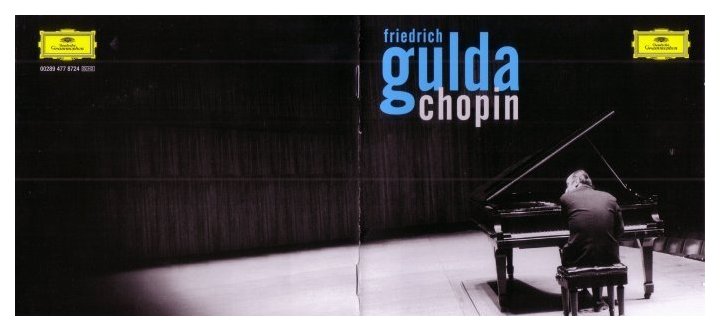
让古尔达的艺术成就停滞在贝多芬曲目的主要原因,或许不在于他对爵士乐的兴趣,而在于他未能追求个人琴技的突破。他曾说:“我的练琴时期是从13到16岁,之后便是寻找音乐真理的过程”,然而,对于一个钢琴家来说,音乐的真理恐怕仍只能透过对技艺的不断精链而达到纯熟的境界。
人物观点
是:“孩子们必须先会在钢琴(或其他乐器)上面敲敲打打,弹出自己喜欢的声音,让他们发生兴趣,情不自禁爱上它,然后再学认谱”。但有时候,这种特立独行并不能被传统所接待,维也纳乐评家将他贴上“古典乐的叛离者”标签,归纳为爵士乐派,对此,古尔达非常不能苟同,在他看来,音乐就是音乐,没有什么古典、现代的界限分别。因此,有一次他应邀前往波兰华沙,并有媒体随行,飞机起飞前,古尔达突然宣布:“如果这些笨蛋也一块去,那我就留在这里”记者们一听,只好尴尬地统统下机离去。
弗利德古尔达天生任性潇洒,特立独行,行径古怪,没有什么朋友,他也不在乎。对自己人同样不护短,有一回古尔达到音乐教授家接儿子,当时钢琴课还没结束,他就问:“我儿子到底有没有音乐天份?”还没等教授答覆,他拉了儿子就走,边走边扭头大声说:“我知道,我儿子根本没有才华。”
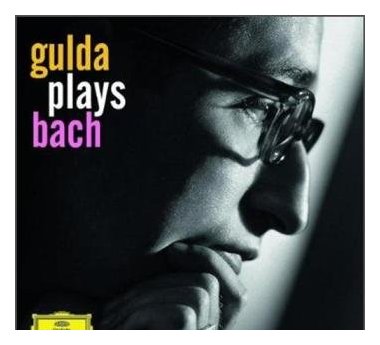
最令人侧目的是,他演奏时不穿燕尾服,经常是一件黑色套头毛衣加一顶犹太小圆帽,有时候甚至光著身体就上台(是对拘泥形式的古典乐一种嘲讽?),但喜爱他的听众皆不以为意,名指挥家波恩姆(Boehm)甚至说:“他弹得实在好,穿游泳裤上台也可以接受。”(为了还报,古尔达竟破例穿上正式礼服。)
家庭生活
古尔达结过两次婚,有三个小孩。其中 Paul 以及 Rico 也都是钢琴家,而古尔达的第二任妻子佑子·古尔达(Yuko Gulda,日本人,旧姓胁山)也是一位钢琴家。虽然古尔达并不喜欢教钢琴,但他在维也纳也指导过一些学生,其中包括玛塔·阿格丽希。
人物评价
古尔达十六岁得瑞士日内瓦钢琴大赛首奖,廿岁年在美国纽约著名卡内基音乐厅登台,大家称赞他是难得一见的天才,关于这点,他又有意见:“非常感谢上天赋予我绝佳音感,凭借这项异能,拓展出音乐的视野与境界,别人怎么说是他们的事,但我自己从未使用过‘天才’这两个字”。
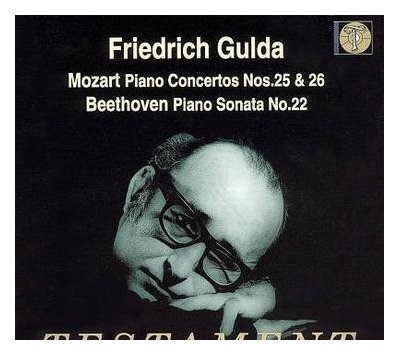
人物影响
1960年,古尔达的兴趣转向爵士乐,对风靡一时的披头四(Beatles)和滚石(Rolling Stones)乐队尤其欣赏,他说:“古典音乐世界里的人不能体会今人的问题,我们活在现代,现代人的感情是和爵士乐联结在一起,而不是和已经死掉几百年的古人”,旋即,抓住披头四和滚石给他启发和灵感,不只自己开爵士演奏会,还进录音室,又灌了一张贝多芬奏鸣曲唱片,结果效果出奇的好,乐评家往往给予最高评价:“对大部份钢琴演奏家而言,贝多芬的作品十分艰深沉重,但到了古尔达手上却如行云流水,自然流畅”,“欧洲爵士交响乐团”成立时,他亦是创办人之一。
他尝试将古典乐与爵士乐融合在一起,1968年在奥地利成立“即兴创作音乐学校”(Improvisationsschule)。他对音乐教育的观点是:“孩子们必须先会在钢琴(或其他乐器)上面敲敲打打,弹出自己喜欢的声音,让他们发生兴趣,情不自禁爱上它,然后再学认谱”。但有时候,这种特立独行并不能被传统所接待,维也纳乐评家将他贴上“古典乐的叛离者”标签,归纳为爵士乐派,对此,古尔达非常不能苟同,在他看来,音乐就是音乐,没有什么古典、现代的界限分别。因此,有一次他应邀前往波兰华沙,并有媒体随行,飞机起飞前,古尔达突然宣布:“如果这些笨蛋也一块去,那我就留在这里”记者们一听,只好尴尬地统统下机离去。
人物轶事
弗里德里希·古尔达天生任性潇洒,特立独行,行径古怪,没有什么朋友,他也不在乎。对自己人同样不护短,有一回古尔达到音乐教授家接儿子,当时钢琴课还没结束,他就问:“我儿子到底有没有音乐天分?”还没等教授答覆,他拉了儿子就走,边走边扭头大声说:“我知道,我儿子根本没有才华”。
最令人侧目的是,他演奏时不穿燕尾服,经常是一件黑色套头毛衣加一顶犹太小圆帽,有时候甚至光着身体就上台(是对拘泥形式的古典乐,一种嘲讽?),但喜爱他的听众皆不以为意,名指挥家波恩姆(Boehm)甚至说:“他弹得实在好,穿游泳裤上台也可以接受。”(为了还报,弗里德里希·古尔达竟破例穿上正式礼服)。
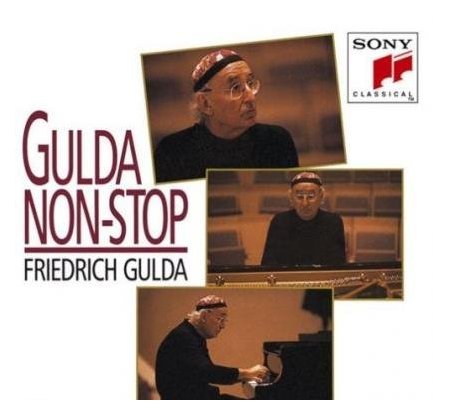
《Gulda Non Stop》专辑介绍
表演者: Friedrich Gulda
专辑类型: Import
介质: Audio CD
发行时间: 1993-03-02
出版者: Sony Classical
唱片数: 1
条型码: 5099705249925
曲目 ——
Gulda: For Rico

Gulda: Cello Concerto - Minuet
Mozart: Fantasia D - Moll K. 397
Gulda: Aria (Solo Version)
Gulda: Prelude and Fugue
Debussy: Préludes: Book Ii, Nr.3 "La Puerta Del Vino"
Debussy: Préludes: Book Ii, Nr. 3 "La Fille Aux Cheveux De Lin"
Chopin: Etude Nr. 7 Cis - Moll Op. 25
Chopin: Barcarolle Fis - Dur Op. 60
Chopin: Nocturne Nr. 2 Fis - Dur Op. 15
Schubert: Impromptu Nr. 3 Ges - Dur Op. 90 D 899
J. Strauss Jr.: Die Fledermaus
J. Strauss Jr.: Brüderlein und Schwesterlein
Traditional: Fiakerlied
Biography
Born in Vienna as the son of a teacher, Gulda began learning to play the piano from Felix Pazofsky at the Wiener Volkskonservatorium, aged 7. In 1942, he entered the Vienna Music Academy, where he studied piano and musical theory under Bruno Seidlhofer and Joseph Marx.
He won first prize at the Geneva International Music Competition in 1946. Initially, the jury preferred the Belgian pianist Lode Backx, but when the final vote was taken, Gulda was the winner. One of the jurors, Eileen Joyce, who favoured Backx, stormed out and claimed the other jurors were unfairly influenced by Gulda's supporters. Gulda began to play concerts worldwide. He made his Carnegie Hall debut in 1950. Together with Jörg Demus and Paul Badura-Skoda, Gulda formed what became known as the "Viennese troika".
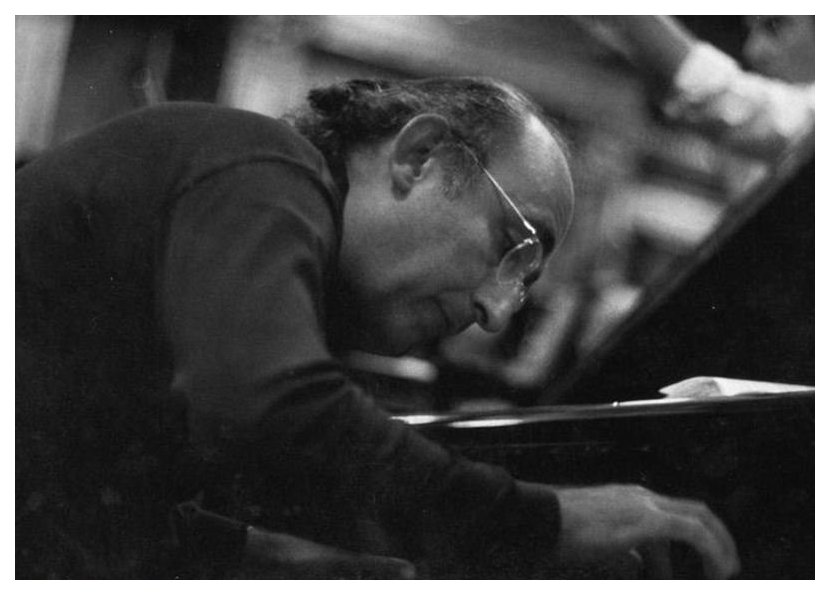
Although most famous for his Mozart and Beethoven interpretations, Gulda also performed the music of J. S. Bach (often on clavichord), Schubert, Chopin, Schumann, Debussy and Ravel. His recordings of Bach's Well Tempered Clavier are well regarded by collectors. Apart from the Well Tempered Clavier, Gulda performed very few other pieces by Bach and recorded even fewer. Gulda's later reliance on co-operating with companies whose recording techniques were primitive in comparison to those espoused by more sophisticated rivals stood him in very poor stead with regard to posterity. The rescued Mozart sonata tapes issued on DG are unbelievably bad in terms of recorded technical quality; likewise the Debussy Preludes and Bach recordings of the late 60s and early 70s.
From the 1950s on Gulda cultivated an interest in jazz, writing several songs and instrumental pieces, and at times combining jazz and classical music in his concerts. In 1956, he performed at Birdland in New York City and at the Newport Jazz Festival. He organized the International Competition for Modern Jazz in 1966, and he established the International Musikforum, a school for students who wanted to learn improvisation, in Ossiach, Austria, in 1968. He once said:
There can be no guarantee that I will become a great jazz musician, but at least I shall know that I am doing the right thing. I don't want to fall into the routine of the modern concert pianist's life, nor do I want to ride the cheap triumphs of the Baroque bandwagon.
In jazz, he found "the rhythmic drive, the risk, the absolute contrast to the pale, academic approach I had been taught." He also took up playing the baritone saxophone.
Gulda wrote a Prelude and Fugue with a theme suggesting swing. Keith Emerson performed it on Emerson, Lake & Palmer's The Return of the Manticore. In addition, Gulda composed "Variations on The Doors' 'Light My Fire'". Another version can be found on Gulda's album As You Like It (1970), an album with standards such as "'Round Midnight" and "What Is This Thing Called Love?". In 1980, he wrote his Concerto for Cello and Wind Orchestra, which has been called "as moving as it is lighthearted", in five movements "involving jazz, a minuet, rock, a smidgen of polka, a march and a cadenza with two spots where a star cellist must improvise."
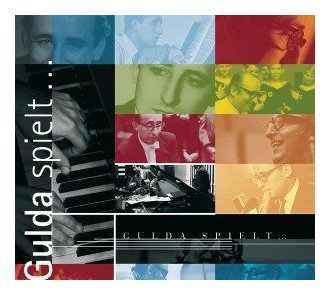
In 1982, Gulda teamed up with jazz pianist Chick Corea, who was between the breakup of Return to Forever and the formation of his Elektric Band. Issued on The Meeting (Philips, 1984), Gulda and Corea communicate in lengthy improvisations mixing jazz ("Some Day My Prince Will Come" and the lesser known Miles Davis song "Put Your Foot Out") and classical music (Brahms' "Wiegenlied" ["Cradle song"]). In the late 1990s, Gulda organised rave parties, where he performed with the support of several DJs and Go-Go dancers.
These unorthodox practices along with his refusal to follow clothing conventions (he was notoriously described as resembling, in one South German concert, "a Serbian pimp") or announce the program of his concerts in advance earned him the nickname "terrorist pianist". In 1988, he cancelled a performance after officials of the Salzburg Festival objected to his including jazz musician Joe Zawinul on the program. When the Vienna Music Academy awarded him its Beethoven Ring in recognition of his performances, he accepted it but then reconsidered and returned it. To promote a concert in 1999, he announced his own death in a press release so that the concert at the Vienna Konzerthaus could serve as a resurrection party.
Phillips Records included Gulda in its Great Pianists of the 20th Century CD box set, which came out in 1999. His piano students included Martha Argerich, who called Gulda "my most important influence," and the conductor Claudio Abbado.
He expressed a wish to die on the birthday of Mozart,[citation needed] the composer he most adored, and did so. He died of heart failure at the age of 69 on 27 January 2000 at his home in Weissenbach, Austria. Gulda is buried in the cemetery of Steinbach am Attersee, Austria.
He was married twice, first to Paola Loew and then to Yuko Wakiyama. Two of his three sons, Paul and Rico Gulda, one from each of his marriages, are accomplished pianists.
A documentary film made for television in 2007, So what?! - Friedrich Gulda, tells a few aspects of his life story. Much more remains to be told.
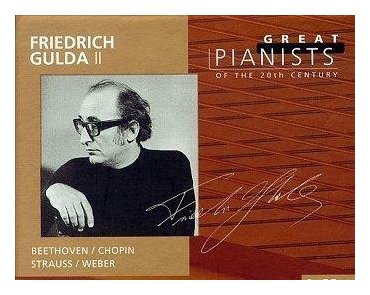
References
1.Jump up ^ Richard Davis, Eileen Joyce: A Portrait, 126-7
2.^ Jump up to: a b c d Chris Woodstra, Gerald Brennan, Allen Schrott, eds., All Music Guide to Classical Music: The Definitive Guide to Classical Music (San Francisco: Backbeat Books, 2005), 538
3.Jump up ^ "Friedrich Gulda, 69, Classical-Music Rebel," New York Times, 29 January 2000
4.Jump up ^ New York Times: "Gulda has Debut as Jazz Pianist," 22 June 1956, accessed 17 September 2011
5.^ Jump up to: a b New York Times: "Brooklyn Sax Man Wins the Big One in Vienna," 17 July 1966, accessed 17 September 2011
6.^ Jump up to: a b c d New York Times: Allan Kozinn, "Friedrich Gulda, 69, Classical-Music Rebel," 29 January 2000, accessed 17 September 2011
7.^ Jump up to: a b New York Times: K. Robert Schwarz , "Gulda Reasserts his Claim to Fame," 25 September 1989, accessed 17 September 2011
8.Jump up ^ Seattle Times: Tom Keogh, "Cellist Joshua Roman returns to Seattle Symphony for opening night," 15 September 2011, accessed 17 September 2011
9.Jump up ^ Peter Gutmann, "Great Pianists of the Twentieth Century," ClassicalNotes.net
10.Jump up ^ New York Times: Anthony Tommasini, "An Enigmatic Pianist Reclaims Her Stardom," 25 March 2000, accessed 17 September 2011
11.Jump up ^ Chris Woodstra, Gerald Brennan, Allen Schrott, eds., All Music Guide to Classical Music: The Definitive Guide to Classical Music (San Francisco: Backbeat Books, 2005), 1
12.Jump up ^ Internet Movie Database: "So what?! - Friedrich Gulda (TV 2007)", accessed 17 September 2011; New York Times: "Friedrich Gulda: So What - A Portrait", accessed 17 September 2011
13.Jump up ^ "Reply to a parliamentary question" (pdf) (in German). p. 67. Retrieved 4 March 2013.
Decorations and awards
1959: Austrian Cross of Honour for Science and Art
1989: Honorary Ring of Vienna

